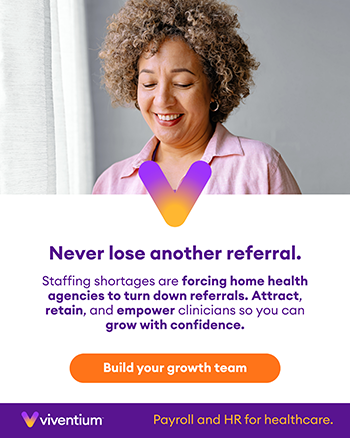by Kristin Rowan, Editor
Leading Associations Attempt to Curb Medicare Advantage Marketing Practices that Prey on the Unsuspecting
For some time now, we’ve been reporting on the marketing practices that Medicare Advantage uses to lure new members. And, it’s working, as more than 50% of eligible patients are now on Medicare Advantage plans. From federal lawsuits to fraud, to upcoding, Medicare Advantage has made headlines more often than almost any other topic in the industry in the last few years. A joint move last week by two national associations may bring the issue to a head once and for all.
The National PACE Association (NPA) and LeadingAge wrote to the Centers for Medicare and Medicaid Services (CMS) urging them to employ stricter oversight on Medicare Advantage marketing practices. The letter, dated July 25, 2024, cited the impact of these marketing tactics on adults served by Programs for All-Inclusive Care for the Elderly (PACE). They called the marketing “aggressive and misleading” and called upon CMS to protect PACE beneficiaries from harm.
One of the selling points in the marketing of Medicare Advantage is the supplemental benefits. Medicare Advantage plans are allocated nearly $64 billion dollars to pay for dental, vision, gym memberships, and other benefits that are not available with traditional Medicare. However, the government has no idea where this money is going, who is using it, and what it’s for. Limited available data suggests that a very low number of Medicare Advantage enrollees are using these supplemental benefits. The rest of the money just sits with the payers at taxpayer expense.
The false promise of cash benefits draw even more of this population away from traditional Medicare and into Medicare Advantage plans. Cash benefits from MA plans are only available to dual eligible members. What they don’t tell you, though, is that if you are dual eligible and you switch from Medicare to Medicare Advantage, you are subject to prior authorization rules, care denials, and smaller networks, meaning you may lose your physician when you switch plans. Some of those cash benefits are restricted to use in particular stores. For example, Aetna restricts the use of cash benefits to stores owned by CVS Health. If there isn’t a CVS Health near you, the cash benefits can’t be used.
PACE Programs
Programs of All-Inclusive Care for the Elderly (PACE) are typically traditional Medicare and Medicaid joint programs that provide medical and social services in home and community-based care settings. The programs cover prescriptions, dental care, emergency services, home care, meals services, primary care providers, nurses, social workers, and more. The program’s goal is to keep patients at home or in their communities and get the health care they need. There is no out-of-pocket costs to these programs for dual eligible members. Medicare only members have a monthly premium and prescription drug (Part D) premium. There are no additional deductibles or copayments for any service or level of care.
Bait and Switch
The marketing messages from Medicare Advantage are pulling PACE eligible members into dual MA and Medicaid plans, which significantly reduce the level of care, access to care, and continuity of care. The MA/Medicaid programs also have higher out-of-pocket costs to members, despite having no monthly premium. Research shows that Medicare Advantage is targeting healthier individuals who will use the provided benefits less often and that when Medicare Advantage patients become sicker, they switch back to traditional Medicare plans if they can.
Your content goes here. Edit or remove this text inline or in the module Content settings. You can also style every aspect of this content in the module Design settings and even apply custom CSS to this text in the module Advanced settings.
 The financial and health implications of uninformed disenrollment from PACE to conventional MA plans are significant. The needs of PACE beneficiaries, most of whom have multiple complex medical conditions, cognitive or functional impairments – or all three – are not comprehensively addressed by MA plans. The loss of PACE services is harmful and, in some cases, can be life-threatening.
The financial and health implications of uninformed disenrollment from PACE to conventional MA plans are significant. The needs of PACE beneficiaries, most of whom have multiple complex medical conditions, cognitive or functional impairments – or all three – are not comprehensively addressed by MA plans. The loss of PACE services is harmful and, in some cases, can be life-threatening.
Dire Need for Change
In their letter to CMS, NPA and LeadingAge called for the following changes to be made:
- Require MA plans to explain, clearly and without embellishment, all out-of-pocket costs and network/coverage limitations. using easy to understand terms
- When a member disenrolls from a PACE program, additional steps should be taken to ensure the disenrollment is voluntary and that the member is fully informed of the differences in coverage before leaving the PACE program.
- Increased leniency in re-enrolling in PACE programs after leaving a Medicare Advantage program by allowing re-enrollment mid-month.
- Require MA brokers, when providing comparative benefit information of their current coverage (e.g., PACE) to an alternate MA plan, to also inform them, in plain language, if the new plan does not cover or coordinate their Medicaid benefits; and any benefits the individual would “lose” under the new plan (e.g., transportation to groceries).
 We share CMS’ stated desire that people have access to accurate and complete information when they make health care choices. We have numerous examples of vulnerable seniors being induced to enroll in MA plans without being fully-informed of what they are giving up when they enroll.
We share CMS’ stated desire that people have access to accurate and complete information when they make health care choices. We have numerous examples of vulnerable seniors being induced to enroll in MA plans without being fully-informed of what they are giving up when they enroll.
The Rowan Report reached out to LeadingAge to see if CMS has responded to their letter.
Updates will be provided when we have them.
# # #


Kristin Rowan has been working at Healthcare at Home: The Rowan Report since 2008. She has a master’s degree in business administration and marketing and runs Girard Marketing Group, a multi-faceted boutique marketing firm specializing in event planning, sales, and marketing strategy. She has recently taken on the role of Editor of The Rowan Report and will add her voice to current Home Care topics as well as marketing tips for home care agencies. Connect with Kristin directly kristin@girardmarketinggroup.com or www.girardmarketinggroup.com
©2024 by The Rowan Report, Peoria, AZ. All rights reserved. This article originally appeared in Healthcare at Home: The Rowan Report. One copy may be printed for personal use: further reproduction by permission only. editor@therowanreport.com



